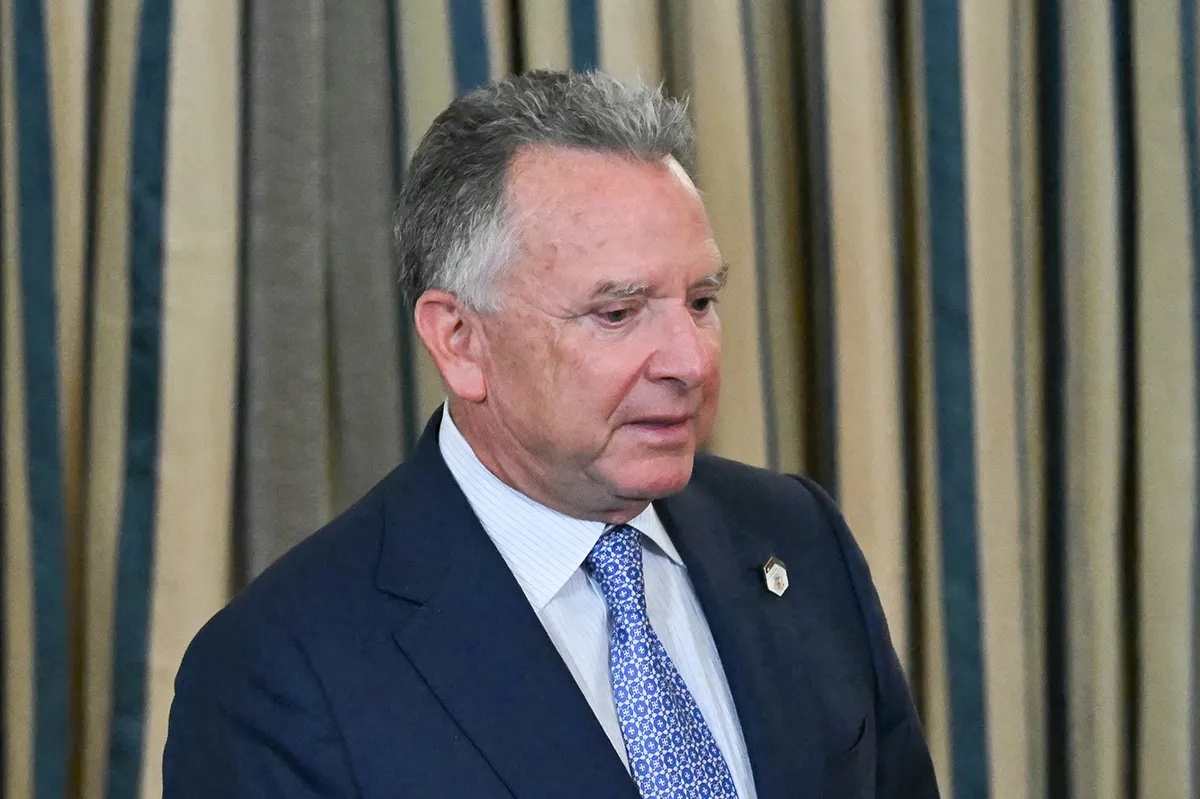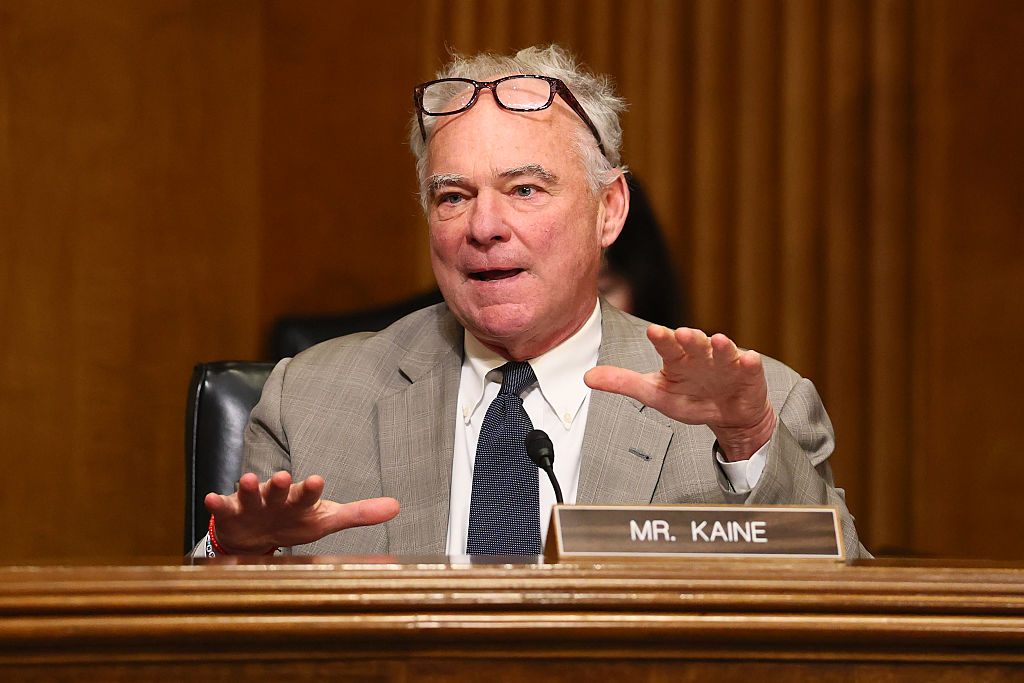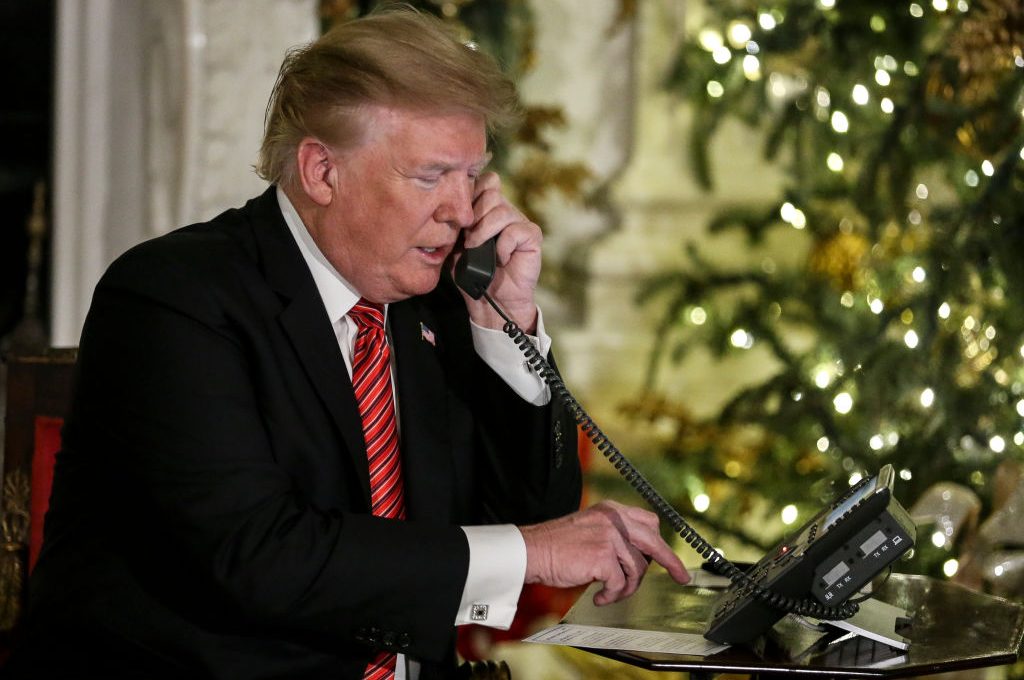‘Have you guys been following 4Chan?’ asks Marjorie Taylor Greene in a 2017 video. A mysterious ‘patriot’ named ‘Q’, Greene explains, is prophesying the downfall of satanic ‘swamp creatures’ in Washington, DC, Hollywood and other liberal fiefdoms. Is Greene a kind of female Alex Jones? No: she is now a Republican congressional candidate in Georgia and, in all likelihood, headed for the House of Representatives.
Only weeks ago, an investigation by Facebook discovered thousands of groups and pages, boasting millions of members and followers, dedicated to QAnon conspiracy theories. In July, Twitter banned more than 7,000 accounts associated with the movement.
QAnon holds that the online scribblings of ‘Q’, an alleged Trump administration insider, expose a war that Donald Trump and his allies have been waging against a cabal of Luciferian child molesters led by the ‘deep state’, Democratic party politicians and figures in Hollywood and the media. In a press conference on Wednesday, Trump said of the movement’s followers, ‘these are people who love our country’ who ‘like me very much’. QAnon has swelled in American cultural life and migrated from social media to the real world. But where will it go from here?
First, let’s wind the tape back. Where did what we might call the ‘paranoid right’ come from? QAnon has roots in the ‘birther’ movement, which aimed to overturn the success of a black Democrat by maintaining that Barack Obama had not been born in America and was not a legitimate presidential candidate.
When Trump won in 2016, the right celebrated a return to power but still found itself derided in the cultural realm. The President was a figure of scorn on CNN and Saturday Night Live, and his ‘deplorables’ were a punchline. Meanwhile, leaks began to filter out of the White House, and judges began to challenge President Trump’s decrees, such as his alleged ‘Muslim ban’.
The right’s attraction to QAnon reflects a fear that the declining cultural and political power of conservatism might be explained by factors greater than the Democrats’ electoral successes. This is not unreasonable. Leftist cultural views dominate academia, pop culture and nongovernmental organizations. Where QAnon goes off the deep end is in the belief that a satanic conspiracy underpins these changes.
To QAnon believers, the inflated social status of progressives like Hillary Clinton and Ellen DeGeneres derives from malignancy. This makes the progressive drift of American life easier to understand and easier to resolve. If only the cabal of pedophiles could be removed, then traditional values and Reagan Republicanism could bloom across America.
It is hard to overstate the lurid weirdness of some of QAnon’s claims. Parts of the QAnon crowd once convinced themselves that John Podesta, Hillary Clinton’s campaign chairman, and his lobbyist brother Tony had personally traveled to Portugal in 2007 to kidnap Madeleine McCann (an English child who disappeared on a family vacation).
The evidence, such as it was, consisted of two sketches of suspects that looked kind of like the brothers if you squinted hard enough. A lot of people on a planet of seven billion look kind of similar to other people. This seemed to have escaped the brave detectives of QAnon, but we are such an unreasonable species that our alarm bells are set off by even the vaguest coincidence relating to a cause or person we already find suspicious. The internet, with the galaxies of data it contains, offers pseudo-evidence to bolster wild suspicions. If your preconceptions are conspiratorial enough, the vaguely odd becomes evidence of sinister intentions and deeds.
This kind of ‘research’ — frenzied dot-connecting between fragments of information across the online expanse — helps to make the phenomenon attractive. Adrian Hon, a designer of alternate reality games (ARGs), has compared QAnon’s appeal to that of a game: ‘There’s something about QAnon like ARGs that reward and involve people for being who they are. They create a community that lets people show off their “research” skills and those people become incredibly valuable to the community.’
You will find incessant references to info and awareness and research among the QAnon crowd. And if something is proved false? We need more info, more awareness, more research! What we never find is systematic argument.
This is why a great deal of QAnon’s energy has been directed inward. Adherents love to ‘research’ in the odder corners of the internet, but have no interest in organization. Where is the push to, say, hire private detectives to investigate their theories? Where is the push to lobby politicians? Where is the push to do anything in the real world except occasionally stand around in public waving ‘Q’ signs? Nowhere. The ‘research’, like the fantasy, is its own reward.
The far left has taken to the streets, vandalizing property, attacking police officers and establishing ‘independent autonomous zones’. The QAnon cultists, meanwhile, have largely stayed at home, trusting ‘the plan’ and tweeting about whether Oprah Winfrey will be arrested for sex trafficking. Someone should make up a conspiracy theory that Q was invented to keep Republicans passive.
Now, I do not advise right-wing activists to behave with the large-scale destructiveness of far left activists. Still, the radical right largely sits at home furiously posting while the radical left blocks roads and attacks federal buildings. Even demonstrations like armed protesters rallying in the Michigan capitol building have been orderly and rare: the wreckage of the Charlottesville rally has not been recreated.
But will this last? Some QAnon supporters do act on their fear and outrage and can be dangerous. Some are dangerous to themselves. QAnon supporters who alienate themselves from their friends and family sink into a quasi-religious dedication to a fantasy subculture, as is being documented in tragic detail by their loved ones on the ‘QAnon casualties’ Reddit forum. While many — and, I hope, most — will eventually tire of playing a kind of postmodern computer game, the true believers have come too far to change course. With so much invested in the fantasy their sense of the world and of themselves depends on its vindication.
President Trump continues not to arrest Hillary Clinton and Oprah Winfrey, and may soon be voted out. Even if the true believers reject some or all of QAnon theory, their apocalyptic preconceptions will soon attach to another set of claims that illustrate the demonic malignancy of their opponents. The capacity for pattern-making and propaganda that the internet provides, combined with the leftward slide of American culture, makes it inevitable.
Several QAnon fanatics have carried threats and violence into real life. There was Edgar Maddison Welch, who marched into Comet Ping Pong, a restaurant in DC that many Trump supporters were convinced was being used as a base for child trafficking, with a three-foot-long rifle; he surrendered when he somehow failed to find any kids. There was Matthew P. Wright, who blocked the bridge over the Hoover Dam with a homemade armored truck and a small arsenal of weaponry. There was Anthony Comello, who convinced himself that the mobster Frank Cali was involved with the ‘deep state’ and promptly killed him. As more QAnoners lose their trust in ‘the plan’ and see their enemies as even more dangerous and powerful than they already believed, QAnon could grow even more violent and ambitious.
Influential right-wing figures should be more responsible than they have been. In June, Eric Trump, the President’s son and campaign surrogate, posted a giant ‘Q’ on Instagram along with the QAnon slogan ‘WWG1WGA’ (‘Where We Go One, We Go All’). If Eric Trump really believes in QAnon, he should stop posting on Instagram and start pressuring his dad to arrest the pedos. It seems likely that he was merely giving a wink and a nod to some of Trump’s most enthusiastic supporters for electoral purposes. As even Republican congressional candidates are known to be followers of ‘Q’, this cynical attempt to ride the tiger is shortsighted as well as cruel.
Even if responsible public figures distance themselves from the Q-munity, does that mean its members are a lost cause? Not necessarily. This is not to claim that there is merit in the mass of quarter-truths and outright lies that make up its belief system. It is to suggest that at least some people could have adopted the fantasy in good faith. It is not bizarre or inexplicable that people were attracted to 9/11 conspiracy theories. No, I do not believe the Twin Towers were brought down by thermite planted by Dick Cheney or Donald Rumsfeld or Ariel Sharon. But genuine mysteries like the redacted sections of the 9/11 Commission Report, combined with the opportunistic manner in which President George W. Bush’s advisers and officials sought to direct the War on Terror, made it inevitable that some American imaginations would run riot.
Similarly, there are serious, depressing truths from which QAnoner consciousnesses spiral into fantasy. Baseless accusations of child abuse are dangerous and immoral, but they find receptive ears in the aftermath of the Epstein affair, in which a rich and powerful sex offender with extensive connections to celebrities, politicians and scientists was arrested before dying in mysterious circumstances. The fantastic tastelessness, hubris and hypocrisy of ‘woke’ neoliberalism, meanwhile, encourages the suspicion that there is something depraved behind the glossy image, if only because then there would be something there at all. In reality, tastelessness and hubris are usually their own explanations.
We should have no time for baseless accusations of criminality. These, apart from being unpleasant in themselves, inspire cult-like behavior and domestic terrorism. But that does not mean we should show no sympathy for people whose alienation from American society and disgust toward the deeds of actual wealthy, influential criminals, especially in a time of vast economic inequality, attract them to theories such as QAnon.
Instead, we should present counter-narratives. Rather than shame the lost, the undereducated and the disappointed for being troubled or angry, we should encourage them to root their ideas in evidence and logic. No doubt it will be impossible to penetrate the most entrenched paranoia. But it would be sad to write off so many people and allow them to sink into an echo chamber from which they might not emerge. If QAnon is a distorted mirror for a broken polity, then American society may yet become a QAnon-style casualty.
This article is in The Spectator’s September 2020 US edition.

























